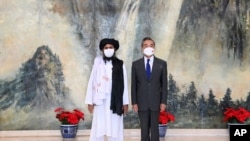ການກັບຄືນໄປກຳອຳນາດ ຂອງກຸ່ມຕາລີບານໃນອັຟການິສຖານ ເກີດຂຶ້ນບໍ່ເທົ່າໃດອາທິດ ຫຼັງຈາກທີ່ຈີນ ໄດ້ໃຫ້ການສະໜັບສະໜຸນ ກຸ່ມຕາລີບານຢ່າງເປີດເຜີຍ.
ບັນດານັກຊ່ຽວຊານກ່າວວ່າ ຈີນກຳລັງເອົາວິທີທາງ ທີ່ເນັ້ນໜັກຄວາມເປັນຈິງຕໍ່ອັຟການິສຖານ ໂດຍຄຳນຶງເຖິງປະຫວັດທີ່ຜ່ານມາຂອງຕົນໃນການພົວພັນກັບກຸ່ມຕາລີບານ.
ຈີນເປັນນຶ່ງໃນບໍ່ເທົ່າໃດລັດຖະບານ ທີ່ໄດ້ຕິດຕໍ່ພົວພັນກັບກຸ່ມຕາລີບານ ແລະສ້າງຕັ້ງສາຍສຳພັນ ກັບກຸ່ມດັ່ງກ່າວ ໃນທ້າຍຊຸມປີ 1990 ອີງຕາມການກ່າວຂອງທ່ານຊອນ ໂຣເບີດສ໌ ອາຈານສອນທີ່ໂຮງຮຽນດ້ານການຕ່າງປະເທດແອລ ສີອັອດຕ໌ ຢູ່ມະຫາວິທະຍາໄລ ຈອຣຈ໌ ວໍຊິງຕັນ ໃນນະຄອນຫຼວງວໍຊິງຕັນ.
ທ່ານໂຣເບີດສ໌ ໄດ້ກ່າວຕໍ່ວີໂອເອ ວ່າ ຈີນ “ໄດ້ເລີ້ມຂັ້ນຕອນອັນນັ້ນໃນປະມານ ປີ 1998 ໂດຍຊຸກຍູ້ໃຫ້ລັດຖະບານປາກິສຖານ ຊຶ່ງເປັນພັນທະມິດທີ່ໃກ້ຊິດກັບຈີນ ແລະໃນປີ 1999 ກະຊວງການຕ່າງປະເທດຂອງຈີນ ໄດ້ສົ່ງຄະນະຜູ້ແທນໄປຍັງອັຟການິສຖານ ເພື່ອພົບປະກັບບັນດາເຈົ້າໜ້າທີ່ຂັ້ນສູງຂອງອັຟການິສຖານ. ແລະໃນປີ 2000 ເອກອັກຄະລັດຖະທູດຂອງຈີນປະຈຳປາກິສຖານ ໄດ້ພົບປະກັບ ທ່ານມູລລາ ໂອມາຣ ໃນເວລານັ້ນ ເປັນຜູ້ນຳຂອງກຸ່ມຕາລີບານ.”
ໃນການພົບປະກັນເຫຼົ່ານັ້ນ ທ່ານໂຣເບີດສ໌ ໄດ້ກ່າວວ່າ ທັງສອງຝ່າຍໄດ້ສ້າງໂອກາດເພື່ອຊ່ວຍລັດຖະບານຂອງກຸ່ມຕາລີບານ ໃນອັຟການິສຖານ ດ້ວຍໂທ ລະຄົມມະນາຄົມ ແລະເປີດເສັ້ນທາງການບິນ ລະຫວ່າງ ກາບູລ ແລະອູຣູມຈີ ຊຶ່ງເປັນເມືອງເອກຂອງແຂວງຊິນຈຽງທີ່ເປັນເຂດປົກຄອງຕົນເອງຂອງຊາວວີເກີໃນຈີນ ບ່ອນທີ່ປະຊາກອນສ່ວນໃຫຍ່ເປັນຊາວມຸສລິມ ແລະບ່ອນທີ່ຈີນມີຊາຍແດນໄລຍະ 80 ກິໂລແມັດ ຕິດກັບເຂດວາຄານ ຂອງອັຟການິສຖານ.
ທ່ານໂຣເບີດສ໌ ໄດ້ກ່າວຕໍ່ວີໂອເອອີກວ່າ “ແລະລັດຖະບານຂອງຈີນໄດ້ຂໍຮ້ອງຕໍ່ກຸ່ມຕາລີບານ ເຮັດທຸກສິ່ງທຸກຢ່າງໃນອຳນາດຂອງພວກເຂົາ ໃຫ້ຄ້ຳປະກັນວ່າ ບໍ່ໃຫ້ມີກຸ່ມຫົວຮຸນແຮງວີເກີໃດໆ ຢູ່ໃນອັຟການິສຖານ ທີ່ອາດຈະເປັນໄພຂົ່ມຂູ່ຕໍ່ຈີນ.” ທ່ານກ່າວໄປວ່າ ກຸ່ມຕາລີບານກໍບໍ່ໄດ້ຮັບປະກັນຫຍັງຫຼາຍວ່າ ກຸ່ມນ້ອຍໆ ຂອງພວກກະບົດວີເກີຈາກຈີນ ຜູ້ທີ່ໄດ້ກໍ່ຕັ້ງພັກອິສລາມເທີກິສຖານຕາເວັນອອກ ທີ່ຮູ້ຈັກກັນໃນຊື່ ຂະບວນການອິສລາມເທີກິສຖານຕາເວັນອອກຫຼື ETIM ທີ່ໄດ້ ປຸກລະດົມເຄື່ອນໄຫວ ນັບຕັ້ງແຕ່ເວລານັ້ນມາ.
ທ່ານຮາຊານ ຄາຣຣາ (Hasan Karrar) ອາຈານສອນຢູ່ທີ່ມະຫາວິທະຍາໄລ ວິທະຍາສາດການຄຸ້ມຄອງ ໃນນະຄອນລາຮໍ ຂອງປາກິສຖານ ໄດ້ກ່າວວ່າ ສາຍສຳພັນຂອງຈີນ ກັບອັຟການິສຖານ ນັບຕັ້ງແຕ່ວັນທີ 11 ກັນຍາ 2001 ເປັນແບບເນັ້ນໜັກໃສ່ຄວາມເປັນຈິງ ແລະວິໄສທັດທີ່ກ້າວໄກ.
The Taliban's return to power in Afghanistan comes just weeks after China's public support for the Taliban.
Experts say China is taking a pragmatic approach to Afghanistan, given its past record of engagement with the Taliban.
China was one of the few governments that reached out to the Taliban and established relations with it in the late 1990s, said Sean Roberts, a professor at the Elliot School of International Affairs at The George Washington University in Washington.
China “started that process in about 1998, urging the Pakistan government, which is a close ally of China," Roberts told VOA. "And in 1999, the Chinese Foreign Ministry sent a delegation to Afghanistan to meet with top Afghan officials. And in 2000, the Chinese ambassador to Pakistan met with (then Taliban leader) Mullah Omar."
Containing Uyghur militants
In those meetings, Roberts said, the two sides set up opportunities to help the Taliban government in Afghanistan with telecommunications and opened a flight route between Kabul and Urumqi, the capital of China's Xinjiang Uyghur Autonomous Region, where most of the population is Muslim and where China shares a 50-mile (80-kilometer) border with Afghanistan's Wakhan Corridor.
"And the Chinese state requested that the Taliban do anything in their power to ensure that there were no Uyghur militant groups in Afghanistan that could threaten China," Roberts told VOA. The Taliban had more or less ensured that the small group of insurgent Uyghurs from China who formed the East Turkistan Islamic Party, also known as the East Turkistan Islamic Movement (ETIM), was immobilized from that time onward, he said.
China's relations with Afghanistan since September 11, 2001, have been pragmatic and far-sighted, said Hasan Karrar, a professor at the University of Management Sciences in Lahore, Pakistan.




